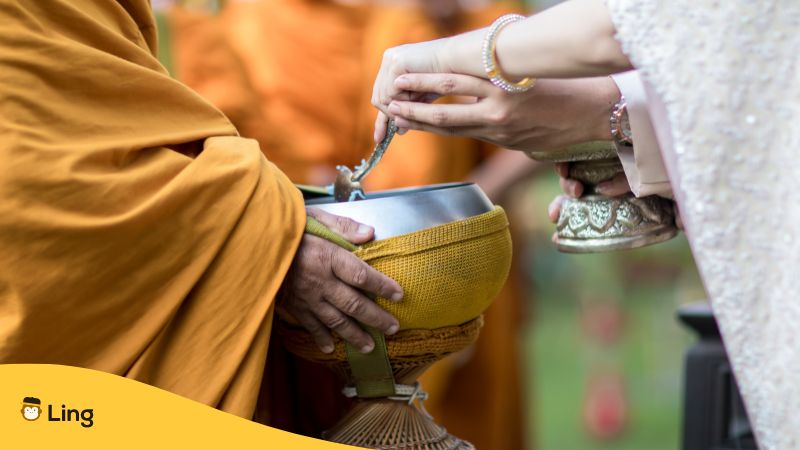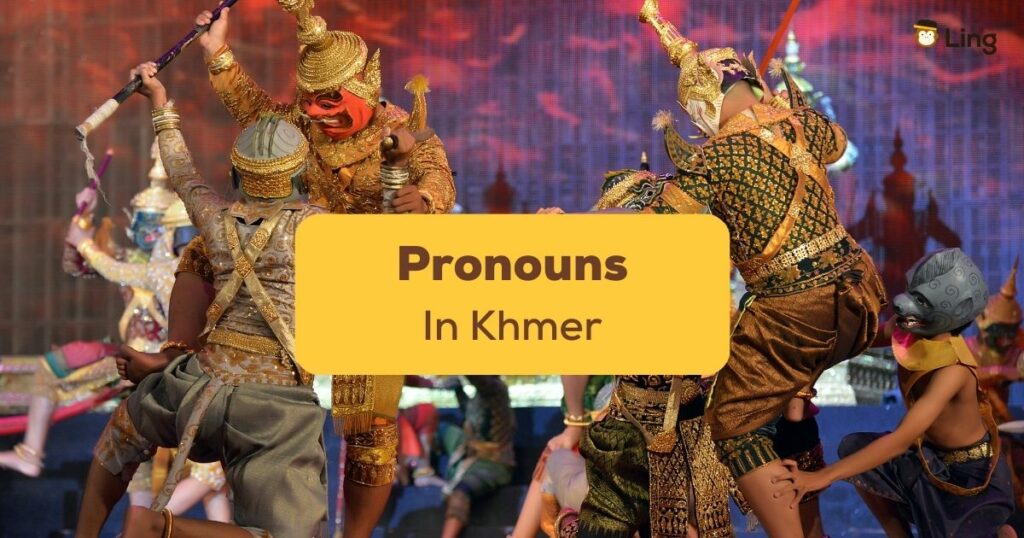In daily speech, the form of the Khmer pronouns (or សព្វនាម pronounced as sapvoneam) is crucial. Therefore, mastering it is a must to sound like a local. With practice, the closer you go to fluency in the Khmer language. But first, we must understand the use of pronouns in Khmer grammar.
There’re a variety of pronouns in Khmer grammar, including those that refer to the first person (speaking person), the second person (the listener), or the third person (persons or things spoken about), indefinite pronouns, and relative pronouns (which link sentences). First, however, this article will focus on personal pronouns and their use.
If you’re having trouble learning Khmer pronouns, look at our blog post on personal pronouns for some advice. Then, please focus on the lesson and observe how each word changes its position in relation to the previous one. Let’s get started!
Khmer Neutral Personal Pronouns
| Subject pronoun | Object pronoun | Possessive adjective | Khmer | Pronunciation |
| I | Me | My | ខ្ញុំ | Khnhom |
| You | You | Your | អ្នក | Neak |
| She | Her | Her | នាង | Nean |
| He | Him | His | គាត់ | Koat |
| They | Them | Their | ពួកគេ | Puok Ke |
| We | Us | Our | យើង | Yeung |
Khmer Intimate Personal Pronouns
These personal pronouns will address intimate friends or individuals of a similar age, status, or position.
| Subject pronoun | Object pronoun | Possessive adjective | Khmer | Pronunciation |
| I | Me | My | អញ | Anh |
| You | You | Your | ឯង | Aeng |
| She | Her | Her | វា | Vea |
| He | Him | His | វា | Vea |

Khmer Pronouns Referring To A Specific Person
| Khmer word | Pronunciation | English word |
| បងប្រុស | Bong Pros | Older brother (you) |
| បង | Bong | Elder sibling (I/me/my) This personal pronoun refers to elder sibling. The husband also uses this pronoun to address himself when speaking to his wife. And his wife refers to her husband with this pronoun. |
| ប្អូន | P’oun | Younger sibling (I/me/my) This personal pronoun refers to a younger sibling. The wife also uses this pronoun to address herself when speaking to her husband. And his husband refers to his wife with this pronoun. |
| ឪពុក | Aupuk | Father |
| ម្តាយ | Mday | Mother |
| តា | Ta | Grandfather |
| យាយ | Yeay | Grandmother |
| មីង | Ming | Aunt A parent’s sister, including a sister-in-law. And it’s a respectful term of address to an older woman who you don’t know. |
| ពូ | Pu | Uncle A parent’s brother or brother-in-law. And it’s a respectful term of address to older men who you don’t know. |
| កូន | Koun | Children Referring to a young child, a person at least one year younger. Also, Khmer children use it to address themselves when speaking to parents or parents talking to their children. |
| ចៅ | Chau | Grandchildren It can be referred to as a young child, a person at least one year younger. |
Khmer Pronouns Related To Social Status
Let’s look at some fascinating facts about Cambodia before we show you how to address monks and members of the royal family using personal pronouns.
Is there a king or queen in charge in Cambodia? Yes, the monarchy had been in place from at least the year 68 AD. A monarch is a symbolic leader to whom people are expected to show love and respect, but his actual power is somewhat limited. And to the Khmer people, the king is also a symbol of stability, peace, and prosperity. We may also discuss Buddhism, which is the official religion of Cambodia and is accepted by 95% of its population. In addition, Christianity and Cham Muslim are both popular and active in the country.
After brushing up on Cambodian culture, let’s get started on the pronouns you need to know to communicate effectively in formal contexts.

Referring To Royal Family Members
- ខ្ញុំព្រះបាទអម្ចាស់ (Khnhom Preah Bat Ang Mchas) – I/me
- ទូលបង្គុំ (Tul Bangkum) – I/me
- ព្រះករុណា (Preah Kakrona) – Your Majesty
- ទ្រង់ (Trong) – He/she/his/her
Lay Buddhist To Buddhist Clergy
- ករុណា (Kakrona) – I/me
- ព្រះតេជគុណ (Preah Decha Kun) – You
- ព្រះអង្គ (Preah Ang) He
Buddhist Clergy To Lay Buddhist
- អាត្មា (Atma) – I/me
- ញោមស្រី (Nhoum Srei) – You (to female)
- ញោមប្រុស (Nhoum Pros) – You (to male)
- ឧបាសក (Ubasak) – He
- ឧបាសិកា (Ubaseka) – She
Summary
And there we have it! In our experience, it is a must to use Khmer pronouns to help you confidently speak the language in full sentences. It helps in the comprehension on the part of the person or thing to whom or to which you’re referring. Since they support the smoothness and clarity of sentences, pronouns are important in writing. Also, it’s a convenient way to express ourselves without having to use our own names. Khmer pronouns, as you can see, aren’t only for making sentences sound nicer; they also require that you use the correct term for the right person, like in the case of monks and royal family members. So we hope that you’ve learned a lot and are now better equipped to use these pronouns.
Learn Khmer With The Ling App
Learn other Khmer pronouns from this blog, then move on to verbs and noun vocabulary. That way, you’ll be able to express yourself fluently with the people you meet. But isn’t it possible that you’re looking for a language application that teaches you more than only pronouns?
We’re ready to go! The Ling App is more than capable of providing you with all the knowledge you’ll need! For those at the beginning or intermediate stages of their Khmer language learning journey, we provide a variety of useful words and phrases. In addition to memorizing Khmer words and practicing Khmer spelling, our chatbot allows you to practice listening skills and engage in conversations immediately. When you often hear a native accent, you’ll develop the skills necessary to communicate with locals in Cambodia.
Are you ready to start now? So download the Ling App from the Google PlayStore and Apple AppStore now, and prepare to be fluent in Khmer very soon!


















